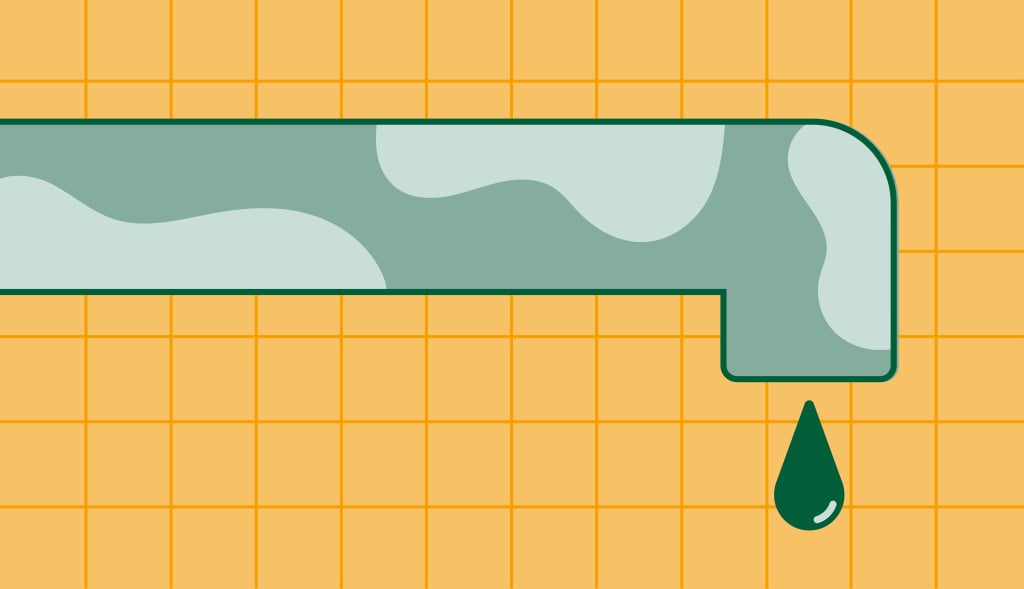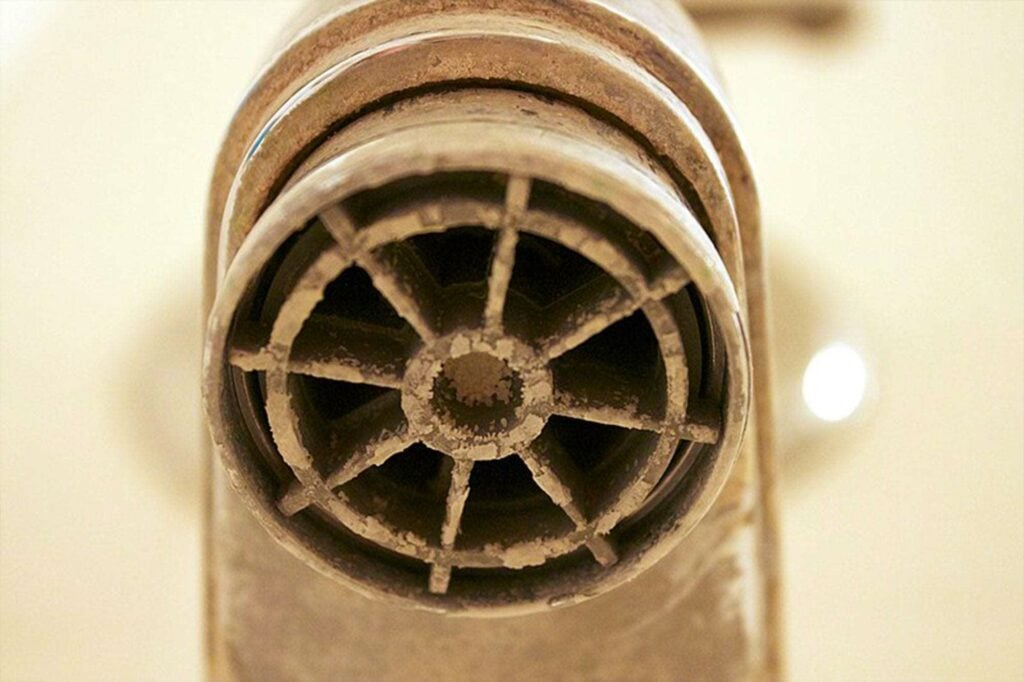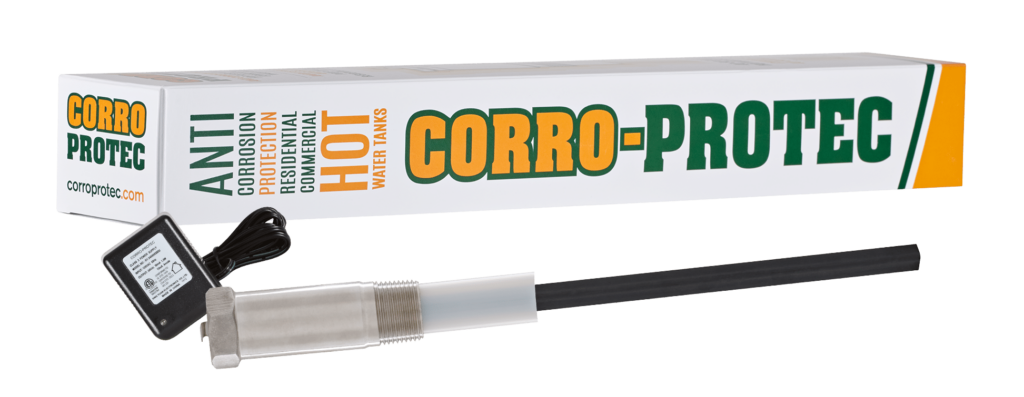Hard Water Stains : 3 Easy Ways To Prevent It

Hard Water Stains Come from Limescale In The Hot Water
Lack of pressure in the faucets, whitish deposits (hard water stains) on the walls of your sink and water fixtures, ever wonder what the cause is? The origin of these inconveniences lies in one word: limescale.
Depending on the region where you live, you may be in contact with more or less calcareous water. In many states, tap water is very calcareous and has dramatic consequences on your pipes, plumbing system, and household appliances. So what are the implications of limestone? And what can you do to remedy this issue?
Limescale Causes
Limescale is a generally hard adherent deposit, sometimes porous, formed mainly by the calcium carbonates present in the water. Limescale deposits cause significant costs for the rehabilitation of water pipes and heating installations and are also responsible for significant energy losses.
The hardness of the water is mainly caused by the presence of Calcium (Ca 2+ ), Magnesium (Mg 2+ ) and Bicarbonate (HCO 3 – ) ions in the water. Limestone (calcium carbonate: CaCO3) is ubiquitous in nature as calcite, marl, chalk, and marble. It is challenging to dissolve.
On the other hand, it becomes easily soluble by chemical reaction with water (H2O) and carbon dioxide (CO2 ) and is transformed into calcium di-hydrogen carbonate Ca (HCO3) that we will find mainly in drinking water. When this water is heated, the chemical equilibrium reverses and leads again to the precipitation and crystallization of the limescale in the form of CaCO3.
Tired of Reading? Solve Hard Water Stains Now!
Skip the small print. Tackle the issue head-on. With Corro-Protec’s electric anode rod, you have the perfect solution for all your hard water stain woes.
Commons Problems Caused by Limescale
Hard Water Stains
Limestone water will deposit on faucets, sinks, shower heads, toilet bowls and countertops, a white deposit (also called mineral deposit) that will give an impression of persistent dirt and promote the proliferation of bacteria. Those hard water stains can be reduced by installing a powered anode rod inside your hot water tank. If you are tired of cleaning hard water stains, you should continue reading!
Limescale damages home appliances

People who live in a limescale region know that a washing machine or any other household appliance lasts less when it comes into contact with very calcareous water. Also what is true for home appliances is also true for taps and sanitary pipes.
Limescale attacks the metal directly and promotes its deterioration. It also increases your energy consumption, especially if you have a water tank or commercial boiler. The accumulation of limescale on the electrical resistance of these devices will cause a drop in its effectiveness . Furthermore, the unit will need to consume more electricity to reach the desired hot water temperature.
More maintenance and dryer skin
Water rich in limestone will be very harsh for the skin. The skin will be drier and more likely to suffer from irritation or eczema. Same thing for the hair.
Finally, the limestone decreases the detergent capacities of detergents and soaps, as well as their foaming power. Therefore, we tend to put more product than necessary on our skin and in our washing machine, which is unhealthy and undesirable.
Hair problems
Although public health and water associations require water companies not to market water too corrosive or aggressive, this does not prevent consumers from being confronted with more or less hard water, especially if they live in a region such as Indiana.
In addition to skin problems, limescale water can have negative impacts on the scalp and cause itching in the head. Indeed, a shower with hard water makes hair brittle, dull and rough. The harmful effects of hard water on the hair are therefore very real.
Is there a remedy for limescale and hard water stains?
There are some ways to reduce the harmful effects of limescale in our home.
Powered Anode Rod
Installing a Corro-Protec powered anode rod is the most affordable solution. The energy sent by the Corro-Protec anode is used to destabilize the calcium molecule found within the water, which has the effect of preventing the chemical reaction that normally creates calcite.
These anodes do not require any maintenance and can last for several decades. However, it should be noted that the powered anode rod only reduces limescale in the hot water tank, it does not completely remove it. After the installation, you will see a great reduction of hard water stains.
Water Softener
Another, more expensive solution, would be to install a water softener. It will be connected directly to the water supply, in a dry, ventilated place, protected from frost and heat. This device filters household water by changing calcium and magnesium ions into sodium ions. But beware, a softener must be monitored and it’s a big investment.
After the installation of the water softener, we recommend that you call in a water treatment specialist every year to do the necessary maintenance and adjustments.
Electronic Descaler
To avoid scale build-up in the pipes, you can also use an electronic descaler. This system, which comes in different forms, reduces the electrical charge of the calcium and magnesium ions that form scale. Once transformed into crystals, the limestone no longer adheres to the walls of the pipes and evacuates with water.





A remedy for hard water stains and limescale? You bet!
Limescale is a generally hard adherent deposit, sometimes porous, formed mainly by the calcium carbonates present in the water. Limescale deposits cause significant costs for the rehabilitation of water pipes and heating installations.
There are ways to reduce the harmful effects of limescale in our home.
Installing a Corro-Protec powered anode rod is the most affordable solution. The energy sent by the Corro-Protec anode is used to destabilize the calcium molecule found within the water, which has the effect of preventing the chemical reaction that normally creates calcite.
After the installation, you will see a great reduction of hard water stains.
Shop today for Corro-Protec Powered Anode Rod !
Blog
Washing Hair in Hard Water: Your Ultimate Guide
Understanding Hard Water and Its Effects on Hair Hard water, characterized by a high concentration of dissolved minerals like calcium and magnesium, can pose several […]
Water Softener Shower Head : 1 Better Alternative
Ongoing exposure to hard water can reduce your shower head flow rate by up to 75%. While many homeowners turn to a water softener shower head, […]


